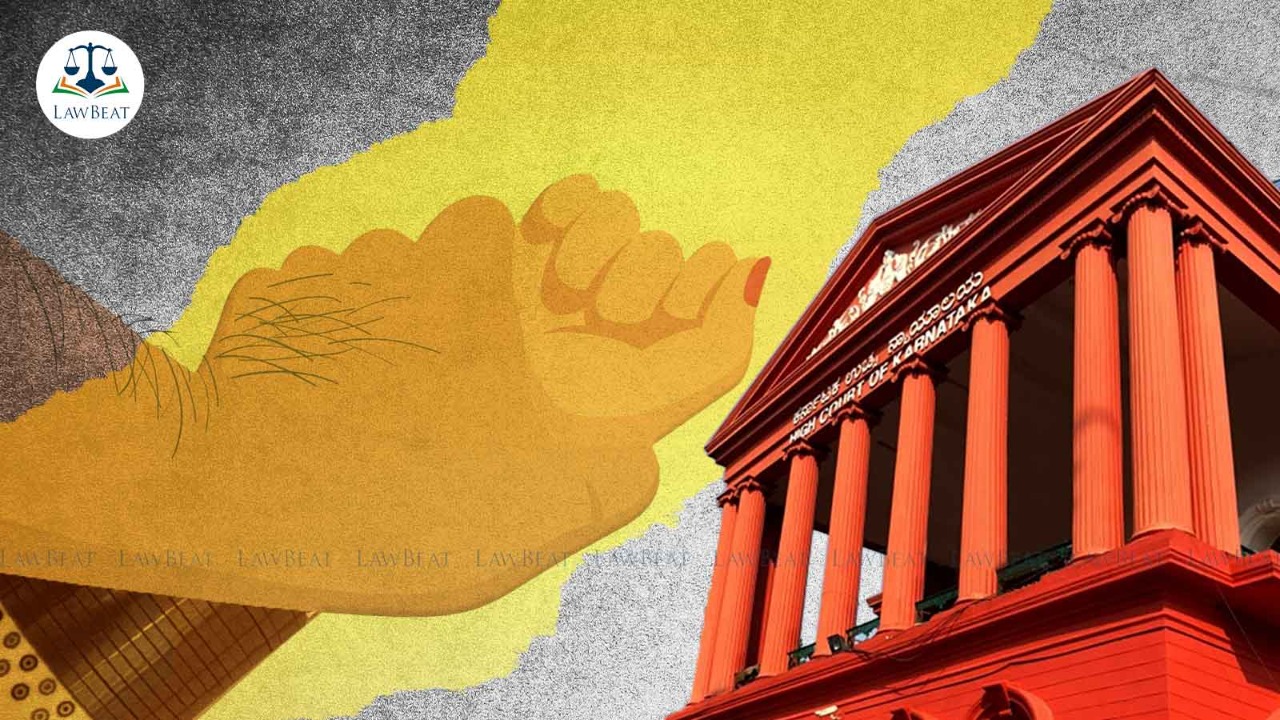"Its imperative for law makers to now 'hear the voices of silence': Karnataka High Court refuses to quash rape case against husband

The Karnataka High Court today in an unprecedented judgment held that a brutal act of sexual assault on the wife, against her consent, albeit by the husband, cannot but be termed to be a rape. "It is, therefore, imperative for the law makers to now “hear the voices of silence"," the Court opined.
A bench of Justice M Nagaprasanna noted that "sexual assault by a husband on his wife will have grave consequences on the mental sheet of the wife, it has both psychological and physiological impact on her.
The bench was hearing a plea filed by a husband seeking quashing of proceedings wherein the Special Court had framed charges against the husband, for offenses punishable under Sections 376, 498A and 506 of IPC and Section 5(m) and (l) r/w Section 6 of the POCSO Act.
It was the submission of the counsel appearing for the Husband that the presumption under Sections 29 and 30 of the POCSO Act is unconstitutional as it imposes a reverse burden of proving innocence on a presumption that the accused is a lady. According to him, this concept is unknown to criminal jurisprudence.
In addition to this, it was further argued that "Even if it is presumed that the burden casts upon the prosecution to prove the foundational facts beyond all reasonable doubt the FIR did not contain the offense alleged against the petitioner for the offense punishable under Section 376 of the IPC."
The bench observed that "A man sexually assaulting or raping a woman is amenable to punishment under Section 376 of IPC. The contention of the learned senior counsel that if the man is the husband, performing the very same acts as that of another man, he is exempted. In my considered view, such an argument cannot be countenanced,"
"What falls for consideration in the subject writ petition is, “Integrity and bodily freedom of a woman, the wife, being ravaged by the husband, whether, could be absolved and protected by a law that mandates equality of its application”.
What pervades the entire petition is, “wanton lust, vicious appetite, depravity of senses, loathsome beast of passion, unbridled unleashing of carnal desire of demonish perversion”. It is these that drove the complainant-wife to register a complaint against the husband for offences punishable, inter alia, under Sections 376 and 377 of the Indian Penal Code. Cognizance being taken against the husband for the rape of his wife, is what drives the accused-husband, to this Court.
The bench dictated its judgment considering the following issues:
- Whether cognizance being taken against the petitioner-husband for offence punishable under Section 376 of IPC is tenable in law?
"If the allegation of rape is removed from the block of offences alleged, it would, in the peculiar facts of this case, be doing tremendous injustice to the complainant-wife and would amount to putting a premium on the carnal desires of the petitioner."
- Whether the allegation against the petitioner for other offences is tenable in law?
"If the petitioner has anything in his defense on the allegations, it is for him to put up such defense before the Sessions Court and come out clean in the trial."
- Whether the prosecution notwithstanding the presumption under Sections 29 and 30 of the Act has to prove the foundational facts beyond all reasonable doubt?
"the prosecution has to prove the foundational facts beyond all reasonable doubt and cannot rest its case on preponderance of probability, merely because the statute imposes reverse burden upon the accused on proving innocence in place of the prosecution proving the guilt."
- Whether the designated Court to try the offences under the Act has jurisdiction to try both the offences under the IPC and the Act in the facts of this case?
"in the light of the judgment of the Apex Court and the provisions of the Act, I am of the considered view that the trial that is now sought to be held before the POSCO Court by the Sessions Judge can also try the offences alleged under the Code."
- Whether charges framed against the petitioner should be altered to include addition of the offence punishable under Section 377 of IPC?
"The finding that when the allegations made against the husband attracts Section 376 of the IPC and a charge is also framed in respect of the said offences, question of considering the request to frame a charge under Section 377 of the IPC does not arise, is erroneous. The allegations clearly make out an offence punishable under Section 377 of the Code which deals with unnatural sex. Therefore, the order under challenge is to be set aside allowing the application filed by the prosecution under Section 216 of the Cr.P.C. with a direction to the trial Court to frame the charge for the offence punishable under Section 377 of the IPC as well. The point that has arisen for consideration is accordingly answered."
The Court further opined that " Woman and man being equal under the Constitution cannot be made unequal by Exception-2 to Section 375 of the IPC. It is for the law makers to ponder over existence of such inequalities in law. For ages man donning the robes of a husband has used the wife as his chattel; but his crude behavior notwithstanding his existence because of a woman. The age old thought and tradition that the husbands are the rulers of their wives, their body, mind and soul should be effaced."
"It is only on this archaic, regressive and preconceived notion, the cases of this kind are mushrooming in the nation. This is in fact in public domain. A brutal act of sexual assault on the wife, against her consent, albeit by the husband, cannot but be termed to be a rape," the bench added.
